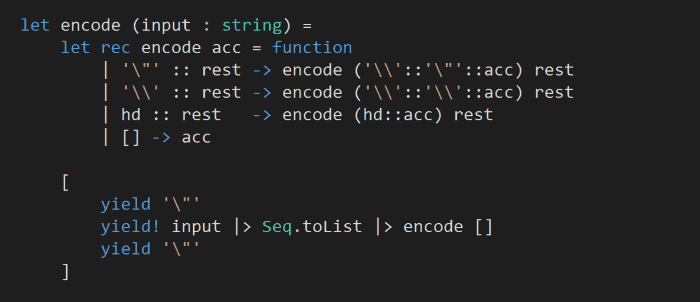
Yan Cui
I help clients go faster for less using serverless technologies.
This article is brought to you by

The real-time data platform that empowers developers to build innovative products faster and more reliably than ever before.
The source code for this post (both Part 1 and Part 2) is available here and you can click here to see my solutions for the other Advent of Code challenges.
Description for today’s challenge is here.
The input for Day 8 looks like the following:
“qxfcsmh”
“ffsfyxbyuhqkpwatkjgudo”
“byc\x9dyxuafof\\\xa6uf\\axfozomj\\olh\x6a”
“jtqvz”
“uzezxa\”jgbmojtwyfbfguz”
“vqsremfk\x8fxiknektafj”
…
bearing in mind that the leading and trailing double quotes (“) are also part of the input and needs to be dealt with.
Since there are so many escape characters in the input, I decided it would be easier to put it in a text file:

and for each line, we will:
- trim the leading and trailing “
- turn the string into a list of chars
- recursively process the list, and unescaped any escaped chars (e.g. \\, \”, \x39):

What’s going on with this:
| IsEscaped (char, rest) -> …
well, that’s our super secret partial active pattern that is responsible for unescaping escaped characters:

Couple of things to note from this:
- it’s taking the entire remainder of the char list as input
- if the list is leading with \\ or \” then the unescaped \ or ” is returned alongside the rest of the list
- in the case of \x66 for example, we can take advantage of int and char conversions:
- int “0x66” will turn the hex value 66 into the corresponding integer value 102
- char 102 will return the char with the corresponding ASCII value – ‘f’
Finally, we just need to compare the total length of the raw input and the unescaped chars:

Part 2
Here we need to do the reverse of what we did in Part 1, but the approach is similar – process each char, and escape \ and ” whenever we see them:

and then just compare the length of the original and the encoded version to answer the challenge:

Whenever you’re ready, here are 4 ways I can help you:
- Production-Ready Serverless: Join 20+ AWS Heroes & Community Builders and 1000+ other students in levelling up your serverless game. This is your one-stop shop for quickly levelling up your serverless skills.
- Do you want to know how to test serverless architectures with a fast dev & test loop? Check out my latest course, Testing Serverless Architectures and learn the smart way to test serverless.
- I help clients launch product ideas, improve their development processes and upskill their teams. If you’d like to work together, then let’s get in touch.
- Join my community on Discord, ask questions, and join the discussion on all things AWS and Serverless.